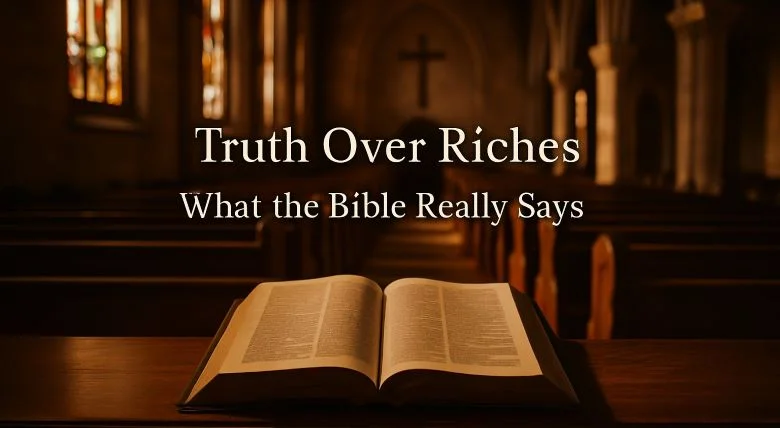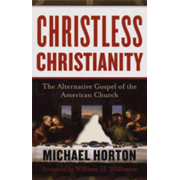Exploring the truth about faith, wealth, and what Jesus really promised.

The prosperity gospel is one of the most talked-about—and misunderstood—teachings in modern Christianity.
At first glance, it sounds hopeful: if you have enough faith, God will bless you with wealth, health, and success. Many find this message uplifting, especially when life feels hard and uncertain. After all, who doesn’t want God’s favor to show up in tangible ways?
But here’s the honest question: Is this really what the Bible teaches? Or have we embraced a version of Christianity shaped more by personal gain than Christ’s call to deny ourselves?
In this post, we’ll take a closer look at what prosperity theology claims, what the Bible actually says about wealth and suffering, and how we can guard our faith from being shaped by false hopes.
What Is the Prosperity Gospel?

The prosperity gospel—sometimes called the “health and wealth gospel” or “word of faith movement”—teaches that God wants all believers to be rich, healthy, and successful. If you just have enough faith, give generously, and speak the right words, blessings will follow.
At its core, it teaches that:
- Faith is a spiritual currency—if you give enough or believe hard enough, you’ll get results.
- Financial giving, especially to church leaders or ministries, will return multiplied blessings.
- Positive words (“name it and claim it”) can shape your reality.
- Sickness and poverty are signs of weak faith or disobedience.
These ideas have grown in popularity through the preaching of some well-known televangelists, books, and viral messages online. For people struggling with debt, illness, or discouragement, the prosperity gospel sounds like a lifeline. But is it biblical?
Key Scriptures Used to Support Prosperity Teachings
Supporters of prosperity theology often point to verses like:
- John 10:10 – “I have come that they may have life, and have it to the full.”
- Malachi 3:10 – “Bring the whole tithe… test me in this… and see if I will not… pour out so much blessing…”
- 3 John 1:2 – “I pray that you may enjoy good health and that all may go well with you…”
On the surface, these verses seem to support health, wealth, and blessing. But context matters.
John 10:10 is about eternal life and spiritual abundance, not money. Malachi 3 addresses a specific covenant with Israel, not a promise of cash returns. And 3 John 1:2 is a greeting, not a doctrinal promise.
Twisting these verses into blanket promises for worldly success not only misleads people—it also ignores the heart of the gospel.
What Does the Bible Really Say About Wealth and Suffering?

The Bible talks a lot about money, but not the way prosperity preachers often do.
Here are a few key truths:
1️⃣ Faith Doesn’t Always Equal Riches
Jesus said in Matthew 6:19-21 not to store up treasures on earth. Paul learned to be content whether he had little or much (Philippians 4:11-13). These teachings point us toward contentment—not constant gain.
2️⃣ Suffering Is Part of the Christian Life
In Luke 9:23, Jesus tells us to take up our cross daily. Paul, one of the most faithful apostles, faced beatings, shipwrecks, hunger, and more (2 Corinthians 11:23-27). Yet his faith never wavered.
3️⃣ God’s Blessings Are Often Spiritual
While God sometimes blesses materially, His greatest gifts are peace, joy, wisdom, and salvation. These are not tied to our bank account or health status.
4️⃣ The Gospel Is Not a Formula
Giving doesn’t guarantee getting. Speaking “faith-filled words” doesn’t control God. He is sovereign, not a vending machine.
Common Claims of Prosperity Preachers—Tested by Scripture
Let’s break down three popular prosperity claims and compare them to the Bible:
Claim 1: “Sow a seed, reap a harvest.”
Based on Malachi 3:10, this idea says that if you give money to a ministry, God will financially bless you. But this isn’t a divine investment plan. In the New Testament, giving is about cheerfulness and generosity, not expectation of return (2 Corinthians 9:7-8).
Claim 2: “Name it and claim it.”
This claim suggests that if you declare something by faith, God must make it happen. But James 4:3 warns about asking with selfish motives. And Jesus Himself prayed, “Not my will, but Yours be done” (Luke 22:42).
Claim 3: “God wants you healthy and wealthy.”
God does heal and bless—but not always. Job, a righteous man, suffered great loss. Paul had a “thorn in the flesh” God chose not to remove (2 Corinthians 12:7-10). True faith remains firm even when God says no.
Real Stories: When Prosperity Promises Fall Short
Many Christians have followed prosperity teachings with sincere hearts—only to be disappointed when life didn’t turn out the way they were promised.
Sarah believed that giving would solve her financial struggles. But after months of faithful tithing and no breakthrough, she began to feel confused and ashamed. Eventually, she found peace in trusting God for daily strength, not quick fixes.
Jake was told he just needed to speak healing over his chronic illness. When healing didn’t come, he questioned his faith—until he discovered that God’s grace is often shown in weakness.
Emily pursued wealth as a sign of blessing. But the more she earned, the emptier she felt. It wasn’t until she began serving others and reading the Sermon on the Mount that she discovered true joy.
These stories are not failures of faith. They are stories of maturing faith—faith that isn’t built on results, but on relationship.
Key Takeaway

The prosperity gospel promises health, wealth, and success—but often at the cost of truth. Scripture teaches us to pursue God Himself, not just His gifts. Real faith is found in following Christ, whether in blessing or brokenness.
A Better Way: Faith Rooted in Christ, Not Cash
God does bless. He provides. He heals. But these blessings come in His time, His way, and for His purposes.
Following Jesus means trusting Him even when life doesn’t make sense. It means rejoicing in spiritual abundance even if your wallet is thin. It means finding hope in eternal promises, not earthly ones.
If you’ve been hurt or confused by prosperity teachings, you’re not alone. And you’re not without hope.
Spend time in Scripture. Surround yourself with a Bible-centered community. Ask hard questions. And know that God welcomes you—doubts and all.
FAQ: Common Questions About the Prosperity Gospel
Is it wrong to pray for financial help?
Not at all. God invites us to bring all our needs to Him (Philippians 4:6-7). The problem comes when we expect God to always answer with material abundance or make wealth the goal.
Didn’t some people in the Bible have wealth?
Yes—Abraham, David, Solomon. But their wealth wasn’t the focus of their faith. Many others, like the apostles, had little and lived sacrificially. God uses both circumstances for His glory.
How can I tell if a pastor is preaching the prosperity gospel?
Watch for repeated focus on money, giving as a way to receive, or guarantees of health and success. Also, look out for teachings that avoid suffering, deny trials, or emphasize earthly rewards over spiritual ones.
What should I do if I’ve followed prosperity teachings?
Start by going back to the Bible. Ask God for wisdom and clarity. Talk to trusted believers or church leaders. The path to truth is always open—and full of grace.
A Final Word: Choose the Cross Over Comfort
Christianity is not a call to chase riches. It’s a call to follow Jesus—even when the path is hard. The Cross may not come with promises of luxury, but it comes with something far better: the presence of Christ, the hope of eternity, and the joy of walking in truth.
If you’ve been chasing prosperity, take a step back. Reflect. And let the simplicity of the gospel—the love of Jesus, the power of the Cross, and the promise of eternal life—lead your heart home.
Affiliate Disclaimer
This post contains affiliate links. If you click on one of the links and make a purchase, I may receive a small commission at no extra cost to you. I only recommend products I truly believe in and think will be beneficial to my readers. Thank you for supporting Biblical Christianity!
Recommended Resource:
Want to go deeper? This eye-opening book by theologian Michael Horton uncovers how the gospel is often distorted—and what the Bible really teaches.

|
Christless Christianity: The Alternative Gospel of the American Church
By Michael Horton Is it possible that we’ve left Christ out of Christianity? In this eye-opening book, Michael Horton explores how modern churches often promote a gospel of self-help, comfort, and personal gain—while pushing Christ to the margins. He exposes the dangers of this trend and calls believers back to the true, biblical gospel of grace and truth. |

Hello Sis Alice!
I enjoyed reading this article and it brings a deeper understanding on how gracious our God is! However, we must pursue the Blessor over the blessings.
God’s purpose for blessing us is to be a blessing for others (2 Cor 9:8).
Looking forward to read more on this! God bless you more!
Hello, Bro. Jess!
Thank you so much for your encouraging words.
I completely agree; pursuing the Blessor over the blessings is key! When our hearts are set on Him first, everything else finds its rightful place.
And yes, 2 Corinthians 9:8 is such a beautiful reminder that God’s blessings are meant to overflow into the lives of others.
I’m glad the article was helpful, and I truly appreciate your support. Looking forward to sharing more soon! God bless you richly as well.
In Christ,
Sis. Alice